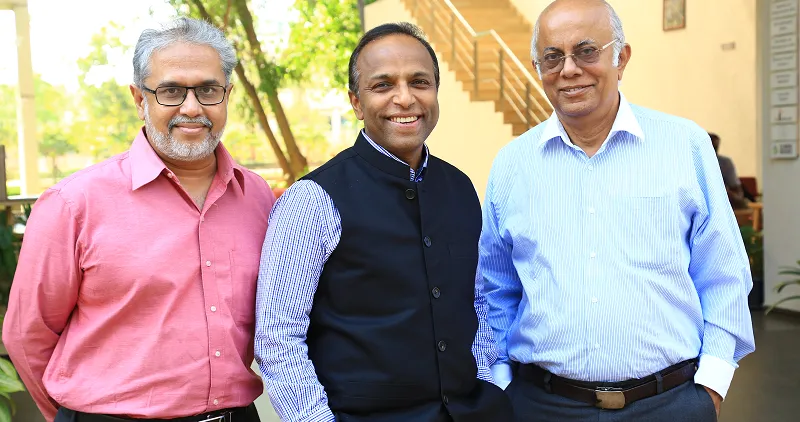How these entrepreneurs aged over 50 are busting the young founder myth
Despite the astounding success of twenty-something entrepreneurs, research reveals that the ‘average age of a successful startup founder is 45’, and that the older you get, the higher the success rate.
Age, Mark Twain famously said, is an issue of mind over matter. If you don’t mind, it doesn’t matter!
But it is widely believed the world over that entrepreneurship is the calling of the young. Mark Zuckerberg and Steve Jobs were in their early twenties when they launched companies that have changed the world. Since then, entrepreneurs have been turning younger every year – we recently heard of 13 and 15-year-olds starting up in India.
With India’s demographic sharply skewed in favour of the youth - 65 percent of India comprises people who are younger than 30 years of age – it’s no wonder that people equate starting up with youth.
But recent research by Harvard Business Review seems to debunk the youth-only mantra for entrepreneurial success. The report revealed that the “average age of a successful startup founder is 45”, adding that the older you get, the higher the success rate.
“The dominance of middle-aged founders in starting the highest-growth companies reflects the propensity of middle-aged people to start ventures. Our evidence points to entrepreneurial performance rising sharply with age before cresting in the late fifties,” the HBR article said.

The Harvard study isn’t the only one that backs older, experienced entrepreneurs.
A study by MIT earlier this year debunked the idea that most successful startup founders are in their twenties. It revealed that the average age of startup founders is around 42, and that 20-something founders have the lowest likelihood of starting a company with a successful exit.
The research finds strong backing among many venture capitalists who believe that the quality of ideas and skill of execution get better with age and experience.
Mohandas Pai, Founder of Aarin Capital, says: “There is no age for a great idea. It can come from anywhere; it is the power of ideas that matters.”
Coming of age
India has, in recent times, seen many startups being founded and led to success by those on the other side of 40. And the ideas aren’t just limited to software, which the world thinks is India’s calling.
Anand Anandkumar founded Bugworks Research Labs with Santanu Datta and V Balasubramanian in 2014, in Bengaluru. Bugworks blends science, software, and a shared vision to take on superbugs or nosocomial infections (commonly known as hospital-acquired infections), which kill millions of people every year. The last drug to take on these superbugs was discovered in the seventies; since then, the bugs have mutated to fight the antibiotic.
The three co-founders are very clear about their roles. Santanu and Balasubramanian are the science and product guys; the story telling and the business roadmap is set by Anand. The three - all over 50 - share a common vision and age is just a number for them.
“I don’t look at age. At any given point of time one has to be articulate and focused on executing the idea,” Anand says. “You always have to get their (VCs’) attention in thirty seconds.” That Bugworks managed to do; the company raised $9 million in Series A funding recently and received a $2.6 million grant in 2017 from CARB-X, a public-private initiative.

Starting up at an older age isn’t only a man’s game. Dr Geetha Manjunath (who is the youngest of the entrepreneurs on this list, but over 45 years) started Niramai, a breast cancer screening company, after 25 years in corporate and government-aided research. She had been in the forefront of research for several years and her CV showcases technology skills like data analytics, big data, cloud computing, and semantic web. But what stands out is Geetha’s zeal and determination – quite like that of a 21-year-old, but tempered with focus and domain expertise. “We are solving a global problem. Our software will screen for breast cancer with image and vision-based algorithms to track temperature, which will help men and women discover cancer at very early stage,” she says.
Today, she juggles talking to investors, patients, and running a business. How did her startup journey happen? Geetha says a couple of years ago her research took a backseat due to the corporate’s global realignment of strategy. That led her to meet and convince investors to support her research. Along with her co-founder, Nidhi Mathur, who is much younger than Geetha, she raised an undisclosed round of funding from Pi Ventures and Binny Bansal to make Niramai a global business.
The power of ideas
S Rao Ganapa and SK Sinha, both over 55 years, founded bootstrapped Labtomarket at IISc, Bengaluru. Their years of work with the railways - SK Sinha built software for them while Ganapa spent two decades as officer of railways – showed them that the software in railways needed a digital overhaul.
The railways still use analogue technology with a digital presence of 40 percent. “Just having computers and some graphs on movement of trains does not mean you are digitally transformed,” Ganapa says.
What does their startup do? Labtomarket weeds out the need for railway gang men, who still walk along tracks and knock on them to figure out the strength of the steel. If they find the pitch (sound) off, they ask the authorities to change the tracks immediately.
“Every month, millions of dollars are lost because of delays and accidents. We are preparing commercial railway lines to use IoT sensors on rail lines for maintenance and smart apps to manage parking and exit of trains at stations,” Sinha says.
Both founders sit at IISc, where the company – founded in 2016 - is incubated. They invested $200,000 of their own money to start up.
There’s no dearth of ideas. And age is definitely no bar.
Raising the bar
Vijay Rekhi, the former MD of United Spirits, started up at the age of 70 years along with the founders of Globus Limited, Ajay Kumar Swarup, and Shekhar Swarup, liquor barons in their own right. Vijay, who worked at United Spirits for four decades, and built it into a multi-billion dollar business, co-founded UniBev in 2016 with $5 million capital.
“The idea was to launch a premium brand that was affordable. We quickly invested in R&D and employed master blenders to create a couple of whiskies that can offer a Scotch and Indian grain blend of a particular vintage,” Vijay Rekhi says.
After a year of R&D and working with the blend master, they created an 18-year and 12-year mix, called Oakton and Governor’s respectively. They also launched a brandy called Laffaire. UniBev is retailing the brand across 300 distribution points across the country, and targeting the Indian liquor industry, which KPMG pegs at $35 billion.

If UniBev is going after distribution, Prem Kumar's SnapBizz is going after kirana stores. “Kiranas are the heart of India and we need to help them use technology to improve their margins,” Prem says. Prem, came to India in 2012 to set up SnapBizz after three decades of working in the FMCG business in India and Russia, and launching a successful mobile phone business in Eastern Europe.
“I realised that the owner is worried about paying the school fees of his children and running his household on a daily basis. The average Indian looks at family first and his business is built around how we can tackle expenses on a daily basis,” Prem says. He adds that technology implementations fail because they do not understand culture and workings of a kirana. He won as business clients up to 50 kiranas in 2012 with the same narrative in the vicinity. The learnings from this helped SnapBizz become a multimillion dollar business (the company does not want to divulge revenues) that now works with more than 1,400 kirana stores.
Their business model makes money from the entire consumer goods business chain and includes four components, three of which are paid modules. It comprises a free app that allows the consumer to transact with the kirana. The second module includes software that helps kiranas capture data of stock sold in the store, which allows them to stock goods based on consumer behaviour. The third module is to help distributors understand what sells in catchments; distributors pay for this data. The final model helps consumer goods companies promote their products in each kirana through a cloud-based, promotion-placement model.
If SnapBizz loves small retailers, there are entrepreneurs who want to help companies save money. IBSFintech is one such startup. It was founded by two bankers - TM Manjunath and Chandra Mohan Grover – after retirement in 2011.
McKinsey & Co estimates global annual treasury operations at $135 trillion. While the market is huge several companies with over $10 billion in forex exposures are still managing forex with Excel tools.
“IBSFINtech intends to solve this with its I-ToC (Innovative Treasury on Cloud) product,” Manjunath says. “We are working on web and mobile versions of the solution that is customisable for treasury and trade finance operations, which can be deployed modularly, or as an end-to-end product, with seamless interfacing with existing IT systems,” he adds.
Both Manjunath and his co-founder are over 55, and believe that they are after solutions that are on-premise and can scale up at the lowest cost.
Golden age
“There are 6,200-plus companies in India, with a turnover in excess of $74 million, which are dependent on spreadsheets and legacy ERP systems to manage critical treasury decision-making, resulting in revenue loss due to volatility in the market,” Chandra adds.
IBSFINtech competes with the likes of SAP, Oracle, and Microsoft. Currently, the leaders in treasury management are Murex and Misys. Infosys also figures in the top ten with Edgeverve.
Clearly age is just a number, and what matters is the idea and the perseverance.







